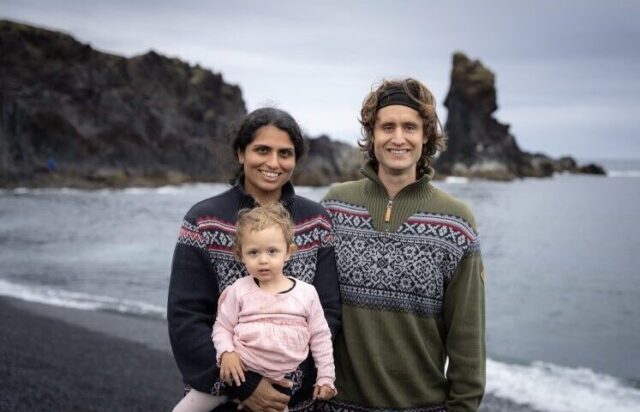Alumni Spotlight: Justin Mullady ’14

Alumni Spotlight: Justin Mullady ’14
Clarke: Usually, we start these conversations by asking where life has taken you since graduation, but for you it might be faster to ask where you haven’t gone.
Justin: Travel has been a big part of my life for a long time! After I graduated Clarke in 2014 with my bachelor’s degree in social work, I earned a master’s degree in social work from the University of Iowa. I celebrated with a three-month solo backpacking trip through Europe, exploring 19 different counties.
I then worked for several years at a non-profit in San Francisco. During this time, I met my future wife, Sandeepa, and she shared that love of exploring. We traveled together through several countries including Peru and India. We got engaged in India, married, and had a daughter shortly after. My daughter has already been to three continents before the age of two, hopefully we can continue this trend as our family grows.
Clarke: When you aren’t traveling the world, your home base is Menlo Park, California, where you both work in the mental health field. Can you share what your areas of focus are?
Justin: For the past several years, I was working with homeless veterans in the San Francisco area. This fall, I became a Social Worker with HUD-VASH, the U.S. Department of Housing and Urban Development’s Veterans Affairs Supportive Housing program. I specialize in finding housing for homeless veterans in the competitive bay area real estate market. After getting them housed, I provide clinical case management for those individuals, including but not limited to issues with PTSD, substance abuse and general living issues. I can have over 40 veterans on my caseload at any given time. The job at times can be very intense and has provided me a deep insight into some of the issues that our veteran population face when they get back home.
One of the most difficult periods for me was during the COVID-19 pandemic. During this time, I witnessed the city that I grew up in and loved fall apart. One can debate the effectiveness of lockdowns, but what I witnessed on the ground level in the poorest communities was devastating. During this time, the overdose rates of the veterans that I worked with skyrocketed, as well noticeable increases in every mental health issue in the book. The issues still very much exist to this day, and it is at crisis levels. Overcoming these issues will take systemic changes within San Francisco, as well as several other major cities. I try to do my part by helping all of those who I can on an individual basis.
My wife works down the road at Stanford University as a clinical neurology professor. She is one of the only researchers in the world working with homeless patients in neurology, and we are both very passionate about our work with underserved populations. We hope to produce change in communities that many may not think or care about.
Clarke: What inspired you to go into such a demanding field?
Justin: Tim Boffeli was my entire inspiration for getting into the mental health profession. His abnormal psychology class set the framework for my future career trajectory. It is funny; in my current job I can see his acted-out stories in the people I work with. Without his enthusiasm for the mental health field, I would not be where I am today. His abnormal psychology lessons still run through my head very often.
When it comes to working in the mental health field, I think compassion is a value that is essential. I feel like I learned this through my time at Clarke, particularly through Tim’s classes. Though his lessons about mental health were very direct and sometimes goofy, he always approached teaching the subject matter with a sincerity and compassion that is hard to find. His lessons were essential in keeping me levelheaded in a career path that has a high burnout rate. Compassion is what keeps me in the game professionally.
Clarke: What are some of your goals moving forward?
Justin: I recently became a licensed clinical social worker in the state of California. I hope to expand upon this with a clinical certification in logotherapy. This will most likely take several years; however, I see a great need in society when it comes to a lack of meaning. This type of therapy attempts to address these issues, so I see it as a worthy pursuit. I hope one day that I can open my own private practice using these techniques.
Personally, my wife and I just closed on a house. We are excited to make it a home this spring as we welcome our second child and expand our family. We also hope to continue to travel the world and expose our children to different cultures.
Thank you for sharing your story with us, Justin! Do you know a member of the Clarke alumni community we should highlight? Submit your nominations for a future Alumni Spotlight by emailing alumnirelations@clarke.edu.
